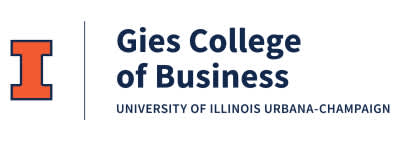Classes start on March 18, 2026.
Enroll by February 5, 2026.
5-24 Months
Minimum time to complete. May vary depending on course load and start date.
$4,164
Tuition and fees are subject to change.
100% online
Faculty teach live classes and offer weekly office hours.
Develop an integrated framework for value-based financial management and individual financial decision-making.
Hands-on practice
Through projects, exercises, and case studies, you’ll build the experience and confidence to apply what you learn in the program on the job.
Top faculty
Benefit from multiple opportunities to engage with and learn from world-class experts. Faculty teach live classes and offer weekly office hours, and teaching staff are available to provide support as needed.
Curated, stackable content
This certificate stacks directly into the full Master of Business Administration (iMBA), Master of Science in Accountancy (iMSA), or Master of Science in Management (iMSM) from the University of Illinois. Upon completion of this certificate program, you can take 12 credit hours of completed work and apply that toward one of those degrees now or in the future.
Program description
Overview
After earning this certificate, you will be able to evaluate major strategic corporate and investment decisions, understand capital markets and institutions from a financial perspective, and develop an integrated framework for value-based financial management and individual financial decision-making.
With this program, you’ll benefit from live, interactive learning sessions with instructors. You’ll receive actionable feedback from teaching staff and your fellow learners. Through hands-on projects, exercises, and case studies, you’ll gain experience, insight, and in-demand financial management skills that you can apply immediately in your career.
The certificate stacks directly into the full Master of Business Administration (iMBA), Master of Science in Accountancy (iMSA), and Master of Science in Management (iMSM) from the University of Illinois.
Required background
To be admitted to this certificate program, you must already hold a bachelor's degree. Professional finance or accounting experience, skills, or knowledge is preferred.
Upcoming Events
Skills you will gain
- Financial Management
- Risk Management
- Investments
- Financial Accounting
- Financial Statement Analysis
- Cash Flow Statement Analysis
Complete 3 required courses
Course 1 of 3
ACCY 500: Accounting Measurement, Reporting, and Control
Overview
During this course, you will explore both foundational and advanced topics of financial accounting. You will start with a general overview of financial accounting information and the main types of financial statements. Afterwards, you will learn how to code financial transactions for accounting purposes. You will also learn about the most important concept in contemporary financial accounting: accrual accounting. You will then critically analyze how firms recognize revenues.
The first half of this course will finish with an analysis of accounting for short-term assets. You will go into the specifics of how firms manage accounts receivables and inventories. In the second half of this course, you will learn in detail how firms account for fixed assets. At this point, you will discuss the financing of assets and accounting for liabilities. You will then continue with an in-depth exploration of shareholders' equity. Finally, you will critically evaluate the preparation, components, and analysis of cash flow statements.
Course 2 of 3
FIN 511: Investments
Overview
As part of this course, you will discuss fundamental principles of trading off risk and return, portfolio optimization, and security pricing. You will study and use risk-return models such as the Capital Asset Pricing Model (CAPM) and multi-factor models to evaluate the performance of various securities and portfolios. You will also be introduced to the two components of stock returns—dividends and capital gains—learning about how each is taxed and the incentives provided to investors from a realization-based capital gains tax.
Course 3 of 3
FIN 570: Corporate Finance
Overview
With this course, you will discover how to use key finance principles to understand and measure business success (as well as identify and promote true value creation). You will also learn financial management tools that allow you to determine the optimal financing and risk management strategies for corporations.
In the first part of the course, you will learn how to use accounting information to form key financial ratios to measure a company’s financial health and to manage a company's short-term and long-term liquidity needs. You will also see how to use valuation techniques to make sound business investment and acquisition decisions. Finally, you will explore how to incorporate risk and uncertainty into investment decisions and evaluate the performance of existing investments.
Through the second part of the course, you will find out how companies choose how much debt to have and which type of debt to issue. You will also learn how payout decisions (dividends and share repurchases) affect firm value and how to determine a company’s optimal payout policy. Eventually, you will understand how to use risk management tools like derivatives and liquidity to mitigate specific risks, such as currency risk. You will apply these tools to develop a financial management framework for M&A decisions and R&D investments.
This certificate stacks directly into the iMBA, iMSA, or iMSM programs from the University of Illinois.
Master of Business Administration (iMBA) - As a student in the iMBA program, you’ll build the advanced skills needed to thrive in leadership roles and be qualified to hold a variety of managerial and executive positions. Poets&Quants, a leading authority on management education, selected the iMBA program as the 2022 MBA Program of the Year and named it the No. 1 Biggest B-School Innovation of the Decade.
Master's of Accounting (iMSA) - Through the online Master of Science in Accountancy (iMSA) program, you can hone skills in analytical thinking, data mining, and strategic accounting. This accounting degree is intentionally flexible to address your needs—whether you seek to begin your career as an accountant, become a CPA, improve your standing in the accounting field and become a CFO, or leverage analytical skills in your existing non-accounting career.
Master of Science in Management (iMSM) - As an iMSM student, you will take a series of fundamental management classes covering subjects such as leadership and teams, marketing management, strategic management, process management, and more. You’ll also take foundational classes in accounting and finance. You will then have the opportunity to customize your degree by taking elective courses focused on topics like global business challenges or data-driven decision-making and communications.

Certificate
Financial Management Graduate Certificate
Financial Management Graduate Certificate Certificate allows you to earn credit directly towards the:

